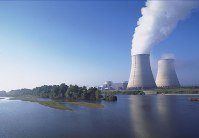An action plan has been drawn up by Areva to mitigate losses and orient itself for the long term. It involves the loss of up to 1500 jobs in Germany.
 |
| Areva will concentrate on work for its existing customer base, such as the owner and operator of the Belleville nuclear power plant, EDF |
The plan was revealed today in Paris by CEO Luc Oursel and CFO Pierre Aubonin. Dubbed 'Action 2016', it is meant to restore the world's biggest nuclear company to its full operating potential by that date.
In response to financial results in 2011 the company's top executives will forego their bonuses while salaries are frozen through 2012. Another freeze applies to hiring at support functions, although a range of activities in training will remain. The only job losses will come in Germany, where 1200-1500 people including contractors will be let go. This amounts to about one quarter of Areva's German workforce across the Erlangen, Offenbach and Karlstein sites.
Oursel said that, "Considering the expected growth in electric consumption, Areva is convinced that the outlook for nuclear and renewable energy remains strong in coming years."
The new strategy breaks down to three directives. The first is to give commercial priority to 'value creation' such as servicing existing customers in nuclear plant maintenance, post-Fukushima upgrades and the fuel cycle. The company will be more selective in capital expenditure until 2016, focusing on safety, security and maintenance and completing projects already launched such as the George-Besse II enrichment plant. "Several capital projects have been suspended because of market uncertainties," said Areva. The last directive is to strengthen financial structure based on better performance, maintaining liquidity - and "implementing a disposal program worth more than €1.2 billion ($1.5 billion)."
The strategy is necessary because of the scale of losses that have mounted in recent years. Reactors in Finland and France have proven more difficult to build than expected, the assets Areva bought with UraMin have been downgraded massively and now the Fukushima accident has hit the uranium and reactor-build markets.
The change in value of former UraMin assets is dramatic, with a provision of €1.4 billion ($1.8 billion) recorded this year, on top of €426 million ($562 million) in 2010. The major factor in this is the difference between chemical and radiometric studies of the Trekkopje deposit in Namibia, which indicate much lower grades of uranium ore and also therefore less uranium: probably 26,000 tonnes instead of the expected 45,200 tonnes.
This has combined with the drop in uranium demand as well as correspondingly lower prices after the Fukushima accident and led Areva to postpone mine development. The accident is also expected to hit Areva's equipment manufacturing and chemistry businesses by about €100 million ($130 million).
A contingency of another €150 million ($197 million) is set aside for the delayed completion of Olkiluoto 3, and €180 million ($237 million) for other unspecified construction and modernisation projects. Some €470 million ($620 million) in contingency is set aside for closing operations at fuel-cycle facilities in France and Belgium.
"As a result of the provisions described above, coming to about €2360 million ($3117 million) in total, the group's consolidated operating income for full-year 2011 should come to a loss in the range of €1.4-1.6 billion ($1.8-2.1 billion)," said the company. Nevertheless, it posted an order book of some €44 billion ($58 billion) and revenues €8.9 billion ($11.7 billion) in 2011.
The company expects to reach break-even point at the end of a 'transition period' covering 2012-3 and see higher growth in a following period covering 2014-6 when it should generate more cash. "Areva must found its development on a long-term vision of the energy market," said Oursel. He expects performance to improve on the basis of five factors: safety, security, economic competitiveness, operations and customers, technologies and human resources.
Researched and written
by World Nuclear News




_23009.jpg)

_13505.jpg)
_87975.jpg)






